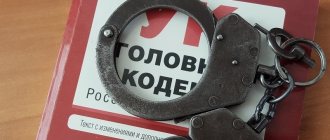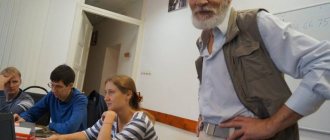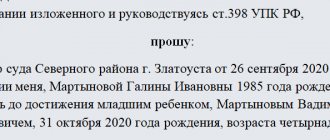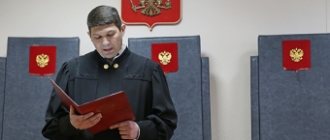Article 226.5. Code of Criminal Procedure of the Russian Federation. Peculiarities of proof during an inquiry in an abbreviated form
- Evidence in a criminal case is collected in a volume sufficient to establish the event of the crime, the nature and extent of the harm caused by it, as well as the guilt of the person in committing the crime, taking into account the features provided for in this article.
- The investigator is obliged to carry out only those investigative and other procedural actions, the failure of which may entail the irreparable loss of traces of the crime or other evidence.
- Taking into account the specific circumstances of the criminal case, the investigator has the right: 1) not to check the evidence if it has not been challenged by the suspect, his defense attorney, the victim or his representative; 2) not interrogate persons from whom explanations were received during the verification of a crime report, except in cases where it is necessary to establish additional factual circumstances relevant to the criminal case, information about which is not contained in the materials of verification of a crime report, or it is necessary to verify evidence, the reliability of which is disputed by the suspect, his defense attorney, the victim or his representative; 3) not to order a forensic examination on questions the answers to which are contained in a specialist’s conclusion based on the results of a study conducted during the verification of a report of a crime, except for the following cases: a) the need to establish additional factual circumstances relevant to the criminal case in a criminal case; b) the need to verify the conclusions of a specialist, the reliability of which has been questioned by the suspect, his defense attorney, the victim or his representative; c) the existence of the grounds provided for in Article 196 of this Code for the mandatory appointment of a forensic examination; 4) not to carry out other investigative and procedural actions aimed at establishing factual circumstances, information about which is contained in the materials of verification of a crime report, if such information meets the requirements for evidence by this Code.
Article 226.6. Code of Criminal Procedure of the Russian Federation. The inquiry period in a shortened form
- The inquiry in an abbreviated form must be completed within a period not exceeding 15 days from the date of the decision to conduct an inquiry in an abbreviated form. This period includes the time from the day the decision to conduct an inquiry in an abbreviated form is issued until the day the criminal case is sent to the prosecutor with an indictment.
- In the cases provided for by part nine of Article 226.7 of this Code, the period of inquiry established by part one of this article may be extended by the prosecutor up to 20 days. A resolution to extend the period of inquiry in an abbreviated form must be submitted to the prosecutor no later than 24 hours before the expiration of the period established by part one of this article.
- The interrogating officer shall notify the suspect, his defense attorney, the victim and his representative in writing about the extension of the investigation period in a shortened form.
- In the event of termination of the inquiry in an abbreviated form and continuation of the criminal proceedings in the general manner, the period of inquiry in an abbreviated form is counted towards the total period of the preliminary investigation.
Article 226.1. Code of Criminal Procedure of the Russian Federation. The basis and procedure for conducting an inquiry in an abbreviated form
- An inquiry in an abbreviated form is carried out in the manner established by Chapter 32 of this Code, with the exceptions provided for by this chapter.
- An inquiry in an abbreviated form is carried out on the basis of a request from a suspect to conduct an inquiry in a criminal case in an abbreviated form and if the following conditions are simultaneously met: 1) a criminal case has been initiated against a specific person on the grounds of one or more crimes specified in paragraph 1 of part three of Article 150 of this Code; 2) the suspect admits his guilt, the nature and extent of the harm caused by the crime, and also does not challenge the legal assessment of the act given in the decision to initiate a criminal case; 3) there are no circumstances provided for in Article 226.2 of this Code that preclude the conduct of an inquiry in an abbreviated form.
General position of the prosecutor
The main task of the prosecutor is to ensure the legality of the investigation, in particular the inquiry. The supervisory authority checks the legality of initiating a criminal case or refusal to initiate proceedings, and gives permission for certain investigative actions.
Further, the prosecutor, in accordance with the provisions of Art. 226 of the Code of Criminal Procedure of the Russian Federation, formally again verifies the completeness and legality of the measures carried out by the investigator.
The interrogator has more limited freedom of action than the investigator. From the point of view of the Code of Criminal Procedure, the prosecutor controls the investigator no less than his immediate superior.
Termination of the case
Art. 226, part 1 of the Code of Criminal Procedure of the Russian Federation indirectly refers to the following circumstances:
- lack of corpus delicti;
- there is no complete proof of the accused’s involvement in the act;
- a law has been issued on amnesty if an act falling under it has been committed;
- the parties reached reconciliation;
- there was active repentance (excludes liability for acts of minor or moderate gravity).
In Art. 226 of the Code of Criminal Procedure of the Russian Federation with comments it is noted that the list of grounds to which indirect reference is given is extensive.
Completion of the abbreviated inquiry
Art. 226.7 of the Code of Criminal Procedure of the Russian Federation almost duplicates the procedure for completing an inquiry conducted in a general form.
Instead of an indictment, a resolution is issued: the manner, place, time and manner of committing the act is described.
The lawyer and the accused are given the opportunity to familiarize themselves with the case materials. They are also given the right:
- request additional investigative actions;
- ask for exclusion from the case of evidence obtained in violation of the law;
- draw up a new indictment.
If it is possible to achieve additional investigative actions and exclusion of evidence, the resolution is re-drafted automatically. And the parties are given the right to familiarize themselves.
Then the materials are submitted for signature to the head of the inquiry agency, and then to the prosecutor’s office.
The prosecutor's options are similar to those described above. He also serves a copy of the approved indictment on the parties to the proceeding.
Features of the trial
Art. 226.9 of the Code of Criminal Procedure of the Russian Federation describes the features of sentencing in cases investigated in the form of an abbreviated inquiry. The judge considers only the evidence specified in the indictment. All other materials are important only for compiling a profile of the accused.
At the same time, the judge has the right to send the case back to the prosecutor if, during the trial, he comes to the conclusion that the investigation needs to be carried out in the general manner.
Consent to a simplified procedure deprives the defendant of the right to refuse it if the case was investigated through a shortened inquiry.
In what form is the case transferred?
An inquiry is a simplified investigation procedure. The result of the investigation is a criminal case, ending with an indictment. The act describes the picture of the crime, evidence of the guilt of the accused person.
The materials are transferred to the head of the inquiry agency, who serves as the initial filter, and from him the case is then transferred to the prosecutor's office. Next, Art. 226 Code of Criminal Procedure of the Russian Federation.
Article 226.2. Code of Criminal Procedure of the Russian Federation. Circumstances excluding the conduct of an inquiry in an abbreviated form
- The inquiry cannot be carried out in an abbreviated form in the following cases: 1) the suspect is a minor; 2) there are grounds for proceedings to apply compulsory medical measures in the manner established by Chapter 51 of this Code; 3) the suspect belongs to the category of persons in respect of whom a special procedure for criminal proceedings is applied, established by Chapter 52 of this Code; 4) a person is suspected of committing two or more crimes, if at least one of them does not relate to the crimes specified in paragraph 1 of part three of Article 150 of this Code; 5) the suspect does not speak the language in which criminal proceedings are conducted; 6) the victim objects to the conduct of the inquiry in an abbreviated form.
- If the circumstances provided for in part one of this article become known or arise after the decision to conduct an inquiry in an abbreviated form is made, but before the criminal case is sent to the prosecutor for approval of the indictment, the person in charge of the criminal case makes a decision to conduct the inquiry in general ok. If the circumstances provided for in part one of this article become known or arise after the criminal case is received by the prosecutor for approval of the indictment and before the criminal case is sent to the court, the prosecutor makes a decision to send the criminal case to the investigator for conducting an inquiry in the general manner. If the circumstances provided for in the first part of this article become known or arise in the course of judicial proceedings before the court retires to the deliberation room to pronounce a verdict, the judge returns the criminal case to the prosecutor to transfer it according to jurisdiction and conduct an inquiry in the general manner.







